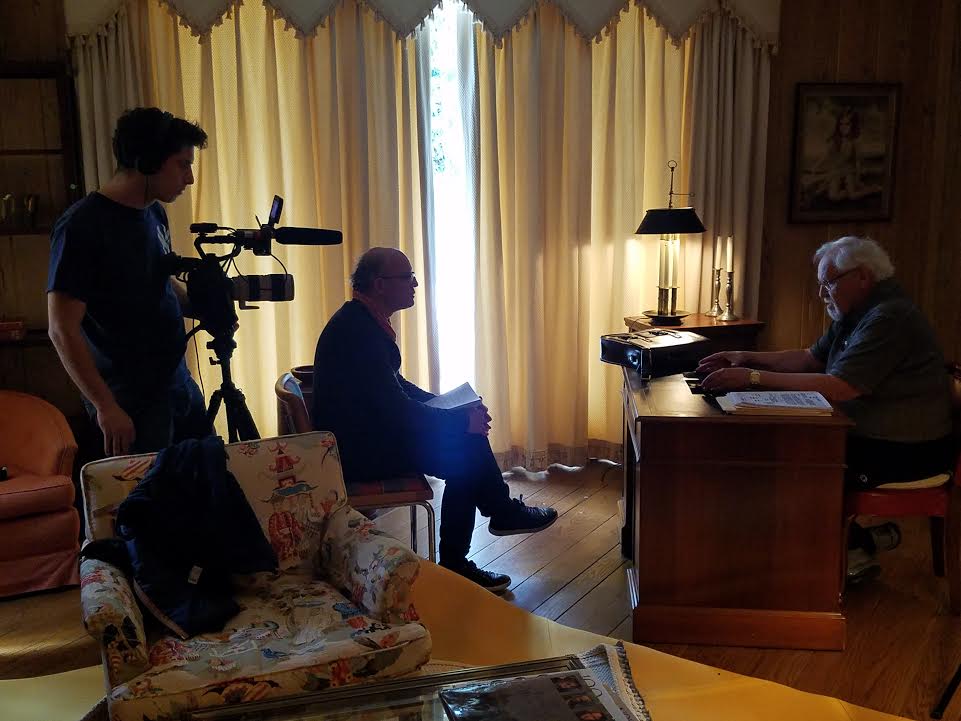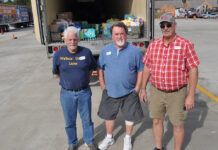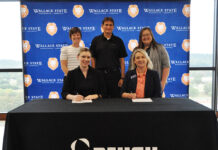Earl Smith, right, speaking with Thierry Ptlantanida, gave his first-hand account of the near-miss nuclear disaster that he helped to divert, in 1961, near Goldsboro, North Carolina. / Kirk Keller
When former North Alabama resident, Earl Smith, dropped in to do an interview about the 1961 nuclear incident in which in which he played a pivotal part, the Freedom of Information Act had just made the 1961 secret documents available to the public. Since then, Smith has been a busy man. Here is the latest on the man who helped to save tens of thousands of lives on American soil in the Cold War.
After having told his story in September 2016 issues of The Moulton Advertiser and The Cullman Tribune, (Read the full backstory at http://qrne.ws/brokenarrow), Earl Smith was invited to a reception in Goldsboro, North Carolina where, in 1961, a near-record breaking nuclear incident took place that is still resonating around the world.
As for Smith himself, he had just lost his wife, and was busy taking care of his rental property near the Talladega Speedway when these stories came out. Since the incident was top secret until recently, Smith had pushed it from his mind until a former military buddy called him about the story being made public following the mandatory 50-year time period. That’s when he came back home to break the story.
He was contacted by Goldsboro historian Kirk Keller, who extended an invitation to speak in the area where all of this took place. Smith accepted Keller’s invitation to speak in Goldsboro, in January of 2017, and was given a true hero’s welcome by the citizens of the place that is still on the map due to his clear thinking and attention to painstaking details outlined in Explosive Ordnance Disposal (EOD) training, from which he had just graduated. (Smith, who was only 24 years old at the time of the incident, will humbly tell you that he just happened to be the one on call that fateful night).
In a note from Keller, the historian has this to say of Earl Smith: “I wish that the story of the ‘Broken Arrow’ mishap will be told as accurately as possible. I was most fortunate to be contacted by Mr. Earl Smith a couple of years ago. Since that time we have become great friends. I am proud that his first-hand account of the incident has received its rightful place in our history books. I believe that we are now on the way to properly recognizing the efforts and self sacrifices that Earl and his fellow E.O.D. buddies made during the heat of the moment on January 24, 1961.”
After speaking at the Goldsboro Rotary, to a crowd of almost 100 members, being taped by Time/Warner, and filmed for the “Tar Heel Traveler” (similar to “Absolutely Alabama”), Smith was featured on the front page of The Goldsboro News Argus. Since then, Smith has gained fame in places all over the world, including catching the attention of a famous Paris film producer, Thierry Ptlantanida, who recently filmed Smith’s first-hand account of the incident.
It seems that Keller, the North Carolina historian who had contacted Smith about speaking in Goldsboro, was then contacted by the Veteran’s Coalition, who had been contacted by the French production company. “The French group was searching for veteran’s who had been present at the time of the occurrence,” explained Keller. “They are filming a documentary called, ‘The Cold War,’ and they wanted to include this incident.”
Once again, Smith found himself in front of a camera, reliving the incident that reportedly would have been the largest nuclear incident of all time. If not for a complicated set of coincidences which led to his being the first set of hands on a bomb hanging precariously to the tangled lines of a parachute suspended from the limbs of a tree in a North Carolina field in the middle of the night, the story could have turned out much differently.
That night in 1961, Airman 1st Class, Earl T. ‘Buster’ Smith, Explosive Ordnance Disposal (EOD) tech, was on call.
As it was, Smith, who was required by law to wait for a second set of trained hands before disarming the bomb, opened the small door in its side, quickly ascertaining that the indicator was in the ‘safe’ position. Of the second bomb known to have been in the plane which went down due to possible engine failure, Smith had no clue of its whereabouts at the time. Had the other bomb detonated, it would have also set off the bomb Smith found in the tree, even though the safety mode had worked on the one whose parachute had meant safety for thousands who were sleeping peacefully in warm beds on that cold morning.
Smith’s account of the incident took about two days to film.
According to Keller, the French producer was very impressive, and has many film accolades and awards. “He worked with Jacques Cousteau for 10 years,” said Keller. “He has made several international films and documentaries that have won top awards.” (See list of films at end of article.)
Smith, who admits to being a little bit nervous at the beginning of the filming, was immediately put at ease by the seasoned documentarian. “He was very professional, very impressive and spoke perfect English,” said Smith. “He was a pleasure to meet and work with.
“I never realized how alive this story was in the area where it happened,” marveled Smith, whose head is still reeling from the whirlwind of media attention he is receiving. “The people who live around there are still very much aware of what happened that night, and what it would have meant if those bombs had detonated.”
Even with all of the media attention, Smith says that the thing he will always remember most is the small handcrafted medal he received from a woman who had just lost everything she owned in a hurricane. “There she was with nothing and she thought enough of me to sit down and make this medal,” said Smith in awe.
According to Smith, Ptlantanida plans to air the film on Paris Channel 5, then it will be passed on to National Geographic and from there to PBS. “He expects the first airing to be about a year from now,” said Smith.
Thierry Ptlantanida director credits
- 2012 A Thirsty World (TV movie documentary)
- 2012 Die durstige Welt (documentary)
- 2010 Tracking the Blue Diamond (TV movie documentary)
- 2007 Demain, un monde sans glace? (documentary)
- 2006 The White Planet (documentary)
- 2003 Arctic Mission: The Great Adventure (video documentary) (co-director)
Writer Credits
- 2010 Tracking the Blue Diamond (TV movie documentary)
- 2007 Demain, un monde sans glace? (documentary)
- 2006 The White Planet (documentary)
- 2003 Arctic Mission: The Great Adventure (video documentary) (co-writer)
Earl Smith is available for speaking engagements. Please contact Loretta Gillespie for his contact information.
Copyright 2017 Humble Roots, LLC. All Rights Reserved.




























